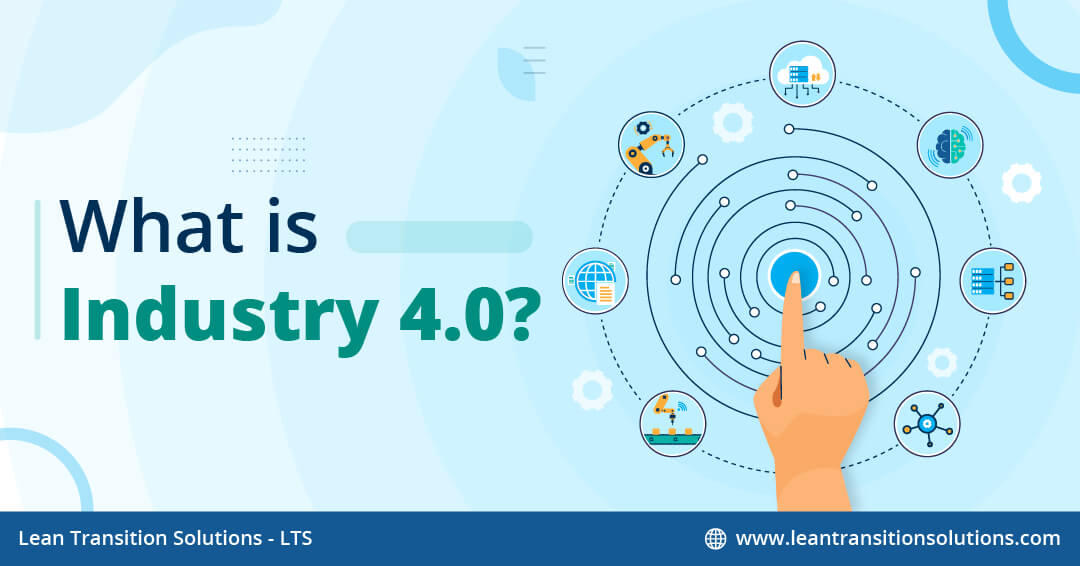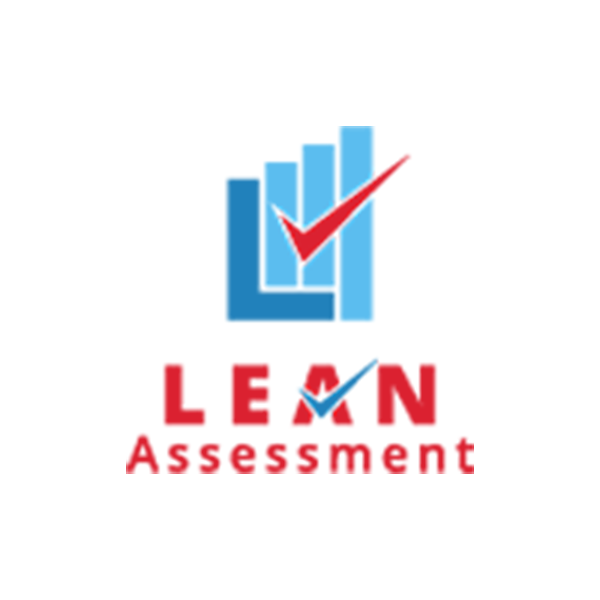What is Industry 4.0 and How does it Work?
- By Brett Griffiths
- Lean Technology
- November 03 , 2023
- Share

In the realm of manufacturing, efficiency, precision, and resource optimisation are not mere aspirations but the very cornerstones of success. In this quest for perfection, the Lean manufacturing industries around the globe have strived to eliminate waste and enhance productivity. The dawn of the fourth industrial revolution, or Industry 4.0, has ushered in a new era of possibilities for lean manufacturers, propelling manufacturing processes to remarkable heights. Let us understand more about Industry 4.0 and how it transforms the manufacturing landscape, offering manufacturers the right tools and insights that are necessary in this competitive world.
What is Industry 4.0?
Industry 4.0, often known as an era of smart manufacturing and digitalisation, represents a transformative leap in the production world. It's about connecting machines and systems using sensors, allowing them to communicate and make decisions autonomously. For lean manufacturers, this means heightened efficiency, reduced waste, and enhanced precision. With advanced technologies like IoT sensors and data analytics, manufacturing processes have become smarter and streamlined. Now, machines can predict when a maintenance need arises, or production lines can adjust in real time to meet specific orders. In essence, Industry 4.0 empowers lean manufacturing by infusing intelligence and adaptability, enabling manufacturers to optimise operations and deliver high-quality products with remarkable efficiency.
Evolution of Industry 4.0
- First Industrial Revolution: The beginning of modern manufacturing began during the late 18th century with the First Industrial Revolution. Water and steam power replaced manual labour, making mass production possible through mechanised processes. This shift from artisanal craftsmanship to machine-driven production laid the foundation for a new era in manufacturing.
- Second Industrial Revolution: A century later, the Second Industrial Revolution transformed manufacturing with assembly lines powered by oil, gas, and electricity. Enhanced communication networks via telephone and telegraph facilitated mass production, ushering in an age in which machines increasingly took charge of repetitive tasks, drastically improving efficiency.
- Third Industrial Revolution: The mid-20th century saw the third industrial revolution, characterised by the infusion of computers, advanced telecommunications, and data analysis into manufacturing. Programmable Logic Controllers (PLCs) were integrated into machinery, marking the digitisation of factories. Automation expanded, and data-driven insights began optimising production processes. This revolution paved the way for smarter, interconnected manufacturing systems, heralding the era of Industry 4.0.
- Fourth Industrial Revolution (Industry 4.0): The present era, Industry 4.0, witnessed technological advancement in manufacturing. Automation reached new heights with smart machines and factories, creating an environment where data-driven decisions enhance efficiency and productivity. Information transparency, achieved by integrating data from the factory floor and enterprise operations, enables smart factories to respond to customer demands with unparalleled agility. This era focuses on mass customisation, allowing manufacturers to achieve efficiency even with JIT production (Just in Time), making way for a future where flexibility, precision, and automation converge to redefine the manufacturing landscape.
How will Industry 4.0 influence Lean Manufacturing?
Internet of Things (IoT) and Connectivity
- Sensors and Data Collection: In Industry 4.0, various sensors are embedded in machines and equipment. These sensors collect data on operational aspects such as temperature, pressure, and performance, providing valuable insights into the manufacturing process.
- Real-time Monitoring and Control: IoT enables real-time monitoring of these sensors. Manufacturers can track operations instantly, allowing them to identify issues promptly and make necessary adjustments, ensuring continuous and efficient production.
Big Data and Analytics
- Data Processing and Analysis: Collected data is processed and analysed using sophisticated algorithms. Data analysis provides manufacturers with a deep understanding of their processes, helping them identify patterns, inefficiencies, and opportunities for improvement.
- Predictive Maintenance and Preventive Maintenance: Through big data analytics, predictive and preventive maintenance models can forecast when machinery might fail, allowing for proactive maintenance. Additionally, analysing data in real time enhances quality control by spotting defects or inconsistencies early in the manufacturing process.
Artificial Intelligence (AI) and Machine Learning
- Smart Decision Making:AI algorithms process large datasets to make intelligent decisions. For instance, AI can optimise production schedules or adjust machine settings dynamically, leading to efficient resource utilisation and reduced downtime.
Cyber-Physical Systems (CPS)
- Synergy between Data Collection and Manufacturing Equipment:CPS fosters improved communication between machines and systems. This synergy allows for collaborative problem-solving, where different components work in harmony, leading to optimised workflows and, ultimately, more productive manufacturing processes.
Industry 4.0 Technologies in Lean Manufacturing
- Robotics and Automation: Robotics and automation systems replace manual labour in repetitive and precise tasks, significantly increasing efficiency and reducing errors. These technologies can work continuously without breaks, leading to higher productivity in lean manufacturing environments.
- Augmented Reality (AR) and Virtual Reality (VR): AR and VR technologies provide immersive training experiences and facilitate maintenance procedures. Employees can receive training in a simulated environment, and maintenance technicians can access real-time information and instructions overlaid on the physical equipment through AR glasses, improving training efficiency and reducing downtime.
- Blockchain Technology: Blockchain technology provides a decentralised and secure way to record transactions and maintain a transparent supply chain. It ensures data integrity, making it difficult to tamper with records. This transparency enhances trust among stakeholders and helps in verifying the authenticity of products and components within the supply chain.
- Cloud Computing: Cloud computing allows manufacturers to store and process vast amounts of data in real time. This facilitates instant access to information from anywhere, enabling better decision-making processes. Moreover, cloud-based collaboration tools enhance communication among teams, both within the organisation and across supply chain partners, fostering seamless collaboration.
- Edge Computing: Edge computing involves processing data near the source of data generation, reducing the time it takes for data to travel back and forth between a centralised server. In manufacturing, this technology enables real-time data analysis and decision-making, which is critical for applications like predictive maintenance and quality control. By reducing latency, edge computing ensures swift responses to changing conditions on the factory floor.
Benefits of Implementing Industry 4.0 in Lean Manufacturing
- Improved Equipment Effectiveness: 4.0 enhances Overall Equipment Effectiveness (OEE) by minimising downtime, optimising equipment utilisation, and improving maintenance strategies through real-time data and predictive analytics. Improved OEE leads to higher production output, reduced costs, and increased profitability, making it a vital metric for manufacturing excellence.
- Cost Reduction: Automation and predictive maintenance minimise waste, reduce energy consumption, and enhance resource allocation, resulting in significant cost savings.
- Improved Quality: Real-time monitoring and data analysis enable early defect detection, ensuring higher product quality and reducing defects and recalls.
- Enhanced Flexibility: Lean production allows for quick adaptation to changing market demands, enabling the production of diverse products without significant retooling.
- Faster Time-to-Market: Streamlined processes and rapid prototyping facilitated by Industry 4.0 technologies enable faster product development and time-to-market, giving a competitive edge.
- Better Decision-Making: Data analytics and AI-driven insights provide actionable intelligence, empowering informed decision-making for process optimisation and strategic planning.
- Enhanced Worker Safety: Smart wearables and monitoring devices improve worker safety by providing real-time alerts, ensuring compliance with safety protocols, and reducing accidents.
- Increased Customer Satisfaction: Personalised production, rapid response to customer demands, and consistent product quality enhance customer satisfaction, leading to higher customer loyalty and a positive brand reputation.
- Ensure Sustainability: Industry 4.0 technologies enable energy-efficient operations, waste reduction, and sustainable practices, aligning your manufacturing processes with environmental conservation goals.
Key Considerations for Lean Manufacturers in Adopting Industry 4.0
- Initial Investment and ROI Concerns: Evaluating the cost of implementing Industry 4.0 technologies against the expected Return on Investment (ROI) is crucial for lean manufacturers. Understanding the initial financial outlay and the long-term benefits is essential for informed decision-making.
- Workforce Training and Skill Gap Challenges: Training the existing workforce and bridging skill gaps are essential. Employees need to acquire new skills to operate and troubleshoot advanced technologies. Companies must invest in training programs to ensure their workforce can effectively utilise Industry 4.0 tools.
- Data Security and Privacy Issues: With increased connectivity and data exchange, ensuring the security and privacy of sensitive data is paramount. Implementing robust cybersecurity measures and compliance with data protection regulations are vital to safeguarding intellectual property and customer information.
- Integration with Legacy Systems: Many lean manufacturing facilities have existing legacy systems. Integrating new Industry 4.0 technologies with these systems can be complex. Compatibility and seamless integration are key challenges that must be addressed to avoid disruptions in operations.
- Regulatory Compliance and Standards Adherence: Adhering to industry standards and regulatory requirements is non-negotiable. Manufacturers must ensure that their adoption of Industry 4.0 technologies aligns with relevant regulations and standards, both in terms of production processes and data management.
Applications of Industry 4.0 Technologies in Various Industries
Industry 4.0 technologies have applications in manufacturing, healthcare, logistics and supply chain management, agriculture, energy and utilities, and the automotive industry. These technologies are revolutionising operations in these industries, driving increased efficiency and innovation.
Let's see examples of how Industry 4.0 solutions have improved processes in the Automotive and Plant Hire industries.
- Predictive Maintenance in the Automotive Industry: Many automotive manufacturers have adopted Industry 4.0-driven predictive maintenance solutions. By utilising IoT sensors and real-time data analysis, they can predict when machinery on the factory floor requires maintenance. This has significantly reduced unplanned downtime, increasing production efficiency and cost savings.
- Fleet Management and Asset Tracking in Plant Hire Industry: In the plant hire industry, companies use Industry 4.0 solutions to track the location and condition of their equipment in real time. IoT sensors are attached to machinery, allowing for proactive maintenance and efficient utilisation. This leads to reduced downtime and cost savings
Industry 5.0
Industry 5.0 represents the advanced state of Industry 4.0, building upon the foundation of automation, data analytics, and IoT devices. Industry 5.0 emphasises human-machine collaboration and a human-centric approach, building on Industry 4.0's seamless integration of digital technologies into manufacturing processes. In this advanced phase, the focus shifts from purely automated processes to a harmonious coexistence between human workers and intelligent machines. Industry 5.0 envisions a future where advanced technologies enhance human potential, leading to a more sustainable, adaptable, and efficient industrial landscape.
As Industry 4.0 transitions into 5.0, it represents a significant step forward; however, it marks just the initial stage of this transformative journey, with Industry 4.0 continuing to be prevalent and actively shaping industries worldwide. Integrating advanced technologies such as automation, data analytics, and IoT devices, Industry 4.0 opens the door for an era of unparalleled efficiency, precision, and innovation. Manufacturers who adopt Industry 4.0 solutions can expect streamlined operations, reduced costs, and improved product quality.
Combining human expertise with intelligent machines drives productivity and fosters new realms of creativity and problem-solving. The adoption of Industry 4.0 solutions, the manufacturing industry is poised to achieve unprecedented growth and progress, offering limitless opportunities for the future.
Start Free Trial
LEAN TRANSITION SOLUTIONS
The Old Vicarage, Pershore Road, Upton Snodsbury, Worcester, Worcestershire, WR7 4NR, United Kingdom.
BLOG
Lean Transition Solution
-
Lean Industry 4.0 Solutions
- TITAN:Computerised Maintenance Management System
- Data Point:Computerised Balanced Scorecard
- Janus: Automated Shop-floor Data Capture System
- T-Card: Integrated Production Planning and Plant Level Execution System
- JDI: Maintenance Automation App
- Maximus: Integrated ERP System
- e-Contractor: Integrated In-house Contractor Management System
- Q-Point: Integrated Quality Management System
- Safety-Point: Integrated Health and Safety Management System
- Lean Assessment: Lean Audit and Assessment System
- Saisho: Lean 5S Audit and Assessment App
- Emergency Response App: To Manage Emergency Situations
-
Leadership 4.0 Solutions
- Your Career Academy(YCA): Learning and Development System
- YCA e-Learning : Management System
- MentorYou(MU): Mentoring App
- Leadership 4.0 : Leadership Transformation Program
- Lean Manufacturing Workshop
- Lean Manufacturing Consulting
- ILM Accredited Green Belt Training and Certification Program
- ILM Accredited Black Belt Training and Certification Program
- Software Development Service
- Resources
- Company
- Contact











